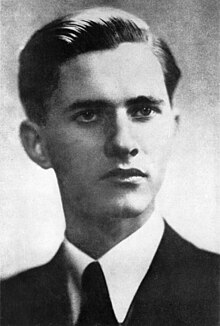This article includes a list of general references, but it lacks sufficient corresponding inline citations. (January 2022) |
| Paul Keres | |
|---|---|
 Keres in 1938 | |
| Country | Estonia Soviet Union (1944–75) |
| Born | 7 January 1916 Narva, Russian Empire (now Estonia) |
| Died | 5 June 1975 (aged 59) Helsinki, Finland |
| Title | Grandmaster (1950) |
| Peak rating | 2615 (July 1971) |
| Peak ranking | No. 11 (July 1971) |
Paul Keres ([ˈpɑu̯l ˈkeres]; 7 January 1916 – 5 June 1975) was an Estonian chess grandmaster and chess writer. He was among the world's top players from the mid-1930s to the mid-1960s, and narrowly missed a chance at a World Chess Championship match on five occasions. As Estonia was repeatedly invaded and occupied during World War II, Keres was forced by the circumstances to represent the Soviet Union (1940–41, 1944–75) and Nazi Germany (1941–44) in international tournaments.
Keres won the AVRO 1938 chess tournament, which led to negotiations for a title match against the reigning World Champion Alexander Alekhine, but the match never took place due to the outbreak of World War II in 1939. Keres was runner-up in the Candidates Tournament on four consecutive occasions in 1953–1962. Due to these and other strong results, many chess historians consider Keres one of the greatest "Super grandmasters"[a] in history, and, along with Viktor Korchnoi, the strongest player never to become world champion.
Widely considered an Estonian national hero,[1] he was nicknamed "Paul the Second", "The Eternal Second", and "The Crown Prince of Chess".[2]
Cite error: There are <ref group=lower-alpha> tags or {{efn}} templates on this page, but the references will not show without a {{reflist|group=lower-alpha}} template or {{notelist}} template (see the help page).
- ^ Leonard Barden (29 September 2023), "Leonard Barden on chess: Pride of Estonia: Paul Keres, one of the best to never hold chess world crown", The Guardian
- ^ David Hooper, Ken Whyld, Kenneth Whyld, The Oxford Companion to Chess, Oxford University Press 1992, page 198